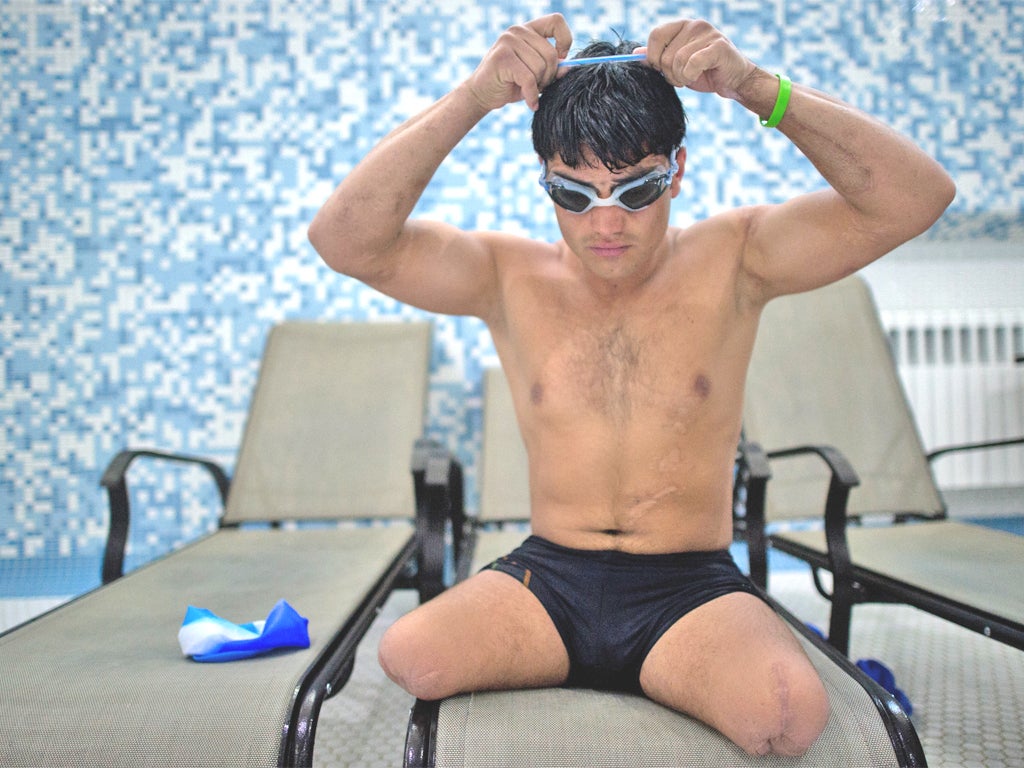Poverty or bad luck no barriers to hope for young Afghan swimmer

Your support helps us to tell the story
From reproductive rights to climate change to Big Tech, The Independent is on the ground when the story is developing. Whether it's investigating the financials of Elon Musk's pro-Trump PAC or producing our latest documentary, 'The A Word', which shines a light on the American women fighting for reproductive rights, we know how important it is to parse out the facts from the messaging.
At such a critical moment in US history, we need reporters on the ground. Your donation allows us to keep sending journalists to speak to both sides of the story.
The Independent is trusted by Americans across the entire political spectrum. And unlike many other quality news outlets, we choose not to lock Americans out of our reporting and analysis with paywalls. We believe quality journalism should be available to everyone, paid for by those who can afford it.
Your support makes all the difference.Malek Mohammed was gathering firewood when he stepped on a buried remnant of Afghanistan's turbulent past. The landmine severed his right leg and flung him into the air.
His left leg was severed when he landed on a second mine.
Malek was 11 at the time and was convinced in his young mind that, even though he had survived, his life was over. The doctors treating him were used to seeing the suffering inflicted by the country's wars, but even they said these were among some the worst injuries they'd had to deal with.
Seven years on, the former baker's boy is striving to make it into his country's team for the Paralympics in London, spending every hour he can practicing the sport he hopes to qualify for: swimming. His adversity, he said, has become his strength: "I try not to think about what I have lost, but what I have gained. Of course, it will be my dream to go to London. But just trying to make it to the games has been exciting."
Nothing is easy for someone like Malek. His original plan was to aim for track and field. But the prosthetic legs he was fitted with after being flown to the US now need adjustment and repair and the technology for that is simply not available in Afghanistan. He has had to ration the time he spends walking, let alone running, to protect his artificial legs as much as possible.
So he has focused on swimming, although the conditions for this are hardly ideal either. Malek does not have access to regular training and the pool in Kabul is too small for someone aspiring to take part in an international event. On many days his parents – who have eight other children – do not have the fare for the taxi Malek needs to take him the ramshackle sports complex.
"We are poor, so it would be unfair of me to ask that the money every day should be spent on taxis. Also we live in a very poor country and there are people far worse off than I am," he said.
"I sometimes wonder what kind of facilities others, in rich countries, have for the Olympics, but there is no point in moaning about it. But just to take part would be great not just for me, but for Afghanistan, I think. It'll show others what can be achieved and that one should not give up."
Earlier this year, the United Nations announced that in 20 years of strife it had dismantled more than 500,000 anti-personnel mines, 22,000 anti-tank mines and 15 million unexploded munitions. These "legacy" weapons killed or wounded 375 children, women and men in 2011 alone. Last year, homemade bombs planted by the Taliban killed another 1,200 and several dozen civilians were killed in air strikes by Western forces.
Malek is now waiting to hear whether the International Paralympics Association will invite him, along with half a dozen other disabled Afghan athletes, to the Games this summer. He has heard reassuring noises from his government, but nothing is certain.
He has received encouragement from others, including a supporter who wrote and signed a message on the back of a photograph of the two together: George Bush Snr. The former President wanted to meet the Afghan boy while he was receiving treatment at a medical centre in California.
Malek said he does not like discussing politics. But he continued: "I am very proud of this photo. He was a very important man and he took the time to see me and I am very grateful."
Join our commenting forum
Join thought-provoking conversations, follow other Independent readers and see their replies
Comments